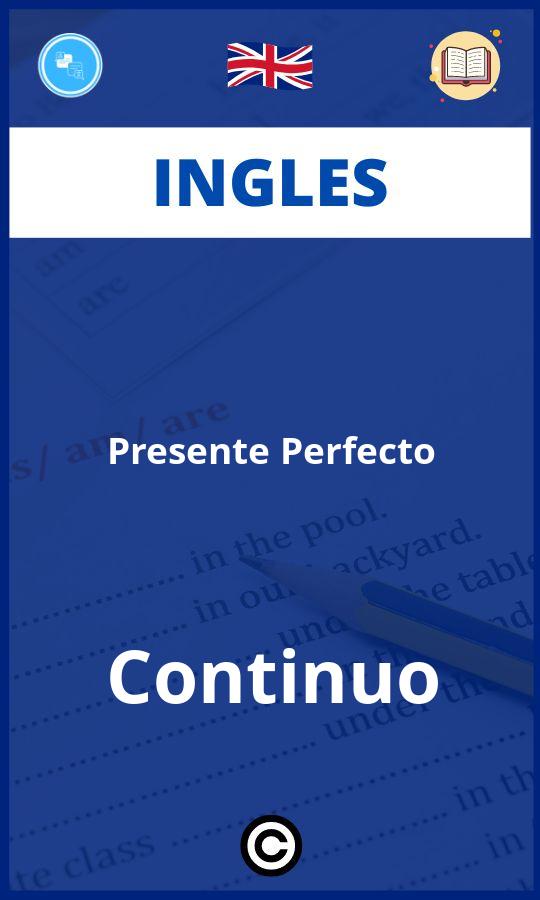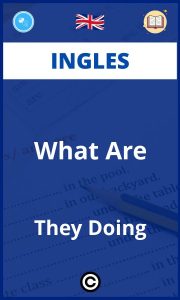
Abrir Ejercicios Presente Perfecto Continuo Ingles – PDF
Teoria : Ejemplos y Explicacion Presente Perfecto Continuo Ingles
El presente perfecto continuo o pretérito perfecto continuo es un tiempo verbal de la lengua inglesa que se usa para hablar de una acción que se ha estado realizando en un momento indeterminado en el pasado, y que aún no ha terminado. En inglés se forma con el verbo auxiliar to have (haber) en su forma presente simple, seguido del verbo principal en su forma gerundio (ing form).
Ejemplos:
- I have been studying English for two years. (He estudiado inglés durante dos años.)
- She has been working at that company for six months. (Ella lleva seis meses trabajando en esa empresa.)
En estos ejemplos, podemos observar que el presente perfecto continuo se usa para hablar de una acción que se está realizando en el pasado, pero que aún no ha terminado. Por ejemplo, en el primer ejemplo, la acción de estudiar inglés se ha estado realizando durante dos años, y en el segundo ejemplo, la acción de trabajar en esa empresa se ha estado realizando durante seis meses.
Otro ejemplo:
- They have been living in that house for five years. (Ellos llevan viviendo en esa casa desde hace cinco años.)
En este ejemplo, la acción de vivir en esa casa se ha estado realizando durante cinco años, y aún no ha terminado.
También se puede usar el presente perfecto continuo para hablar de una acción que se ha estado realizando en un momento específico en el pasado. En este caso, se debe usar una expresión temporal como for two hours (durante dos horas), since Monday (desde el lunes), etc.
Ejemplos:
- I have been studying English for two hours. (He estudiado inglés durante dos horas.)
- She has been working at that company since Monday. (Ella lleva trabajando en esa empresa desde el lunes.)
En estos ejemplos, la acción de estudiar inglés o trabajar en esa empresa se ha estado realizando en un momento específico en el pasado (durante dos horas o desde el lunes), y aún no ha terminado.
Ejercicios con soluciones de Ingles Presente Perfecto Continuo
Here are some exercises to help you practice using the Present Perfect Continuous. Each exercise has a short conversation followed by some questions. For each question, choose the best answer. Don’t worry if you don’t know all the words – just concentrate on the grammar.
Exercise 1
Read the conversation and answer the questions.
Mike: I’ve been studying English for six months now.
Sarah: Have you been studying English for six months now?
Mike: Yes, I have. I’m getting better, but I still make a lot of mistakes.
Sarah: Yes, you do. But you’ll improve if you keep studying.
1. How long has Mike been studying English?
2. What does Sarah think of Mike’s English?
3. Will Mike improve if he keeps studying?
1. Mike has been studying English for six months.
2. Sarah thinks Mike’s English is good but he still makes a lot of mistakes.
3. Sarah thinks Mike will improve if he keeps studying.
Exercise 2
Read the conversation and answer the questions.
Jill: I’ve been living in New York for two years.
Jack: Have you been living in New York for two years?
Jill: Yes, I have. I love it here.
Jack: Yes, you do. I can’t wait to move here.
1. How long has Jill been living in New York?
2. What does Jack think of Jill’s New York?
3. Does Jack want to move to New York?
1. Jill has been living in New York for two years.
2. Jack thinks Jill loves New York.
3. Jack wants to move to New York.
Exercise 3
Read the conversation and answer the questions.
Tom: I’ve been working on this project for two weeks and I’m still not finished.
Ann: Have you been working on this project for two weeks?
Tom: Yes, I have. I’m starting to get a little bit frustrated.
Ann: Yes, you are. Maybe you should take a break and come back to it later.
1. How long has Tom been working on the project?
2. What is Tom starting to feel?
3. What does Ann suggest Tom should do?
1. Tom has been working on the project for two weeks.
2. Tom is starting to feel frustrated.
3. Ann suggests Tom should take a break and come back to the project later.
Exercise 4
Read the conversation and answer the questions.
Mary: I’ve been studying for my test all day and I’m still not ready.
John: Have you been studying for your test all day?
Mary: Yes, I have. But I’m just not sure if I’m going to be able to pass.
John: Yes, you are. I’m sure you’ll do fine.
1. How long has Mary been studying for her test?
2. What is Mary not sure about?
3. What does John think Mary will do?
1. Mary has been studying for her test all day.
2. Mary is not sure if she is going to be able to pass her test.
3. John thinks Mary will do fine on her test.
Exercise 5
Read the conversation and answer the questions.
Susan: I’ve been taking these new vitamins for two weeks and I’m already feeling better.
Steven: Have you been taking these new vitamins for two weeks?
Susan: Yes, I have. I’m not sure if it’s the vitamins or just a coincidence.
Steven: Yes, you are. I’m sure the vitamins are helping.
1. How long has Susan been taking the new vitamins?
2. What is Susan not sure about?
3. What does Steven think?
1. Susan has been taking the new vitamins for two weeks.
2. Susan is not sure if it is the vitamins or just a coincidence that she is feeling better.
3. Steven thinks the vitamins are helping.
Abrir Ejercicios Presente Perfecto Continuo Ingles – PDF






